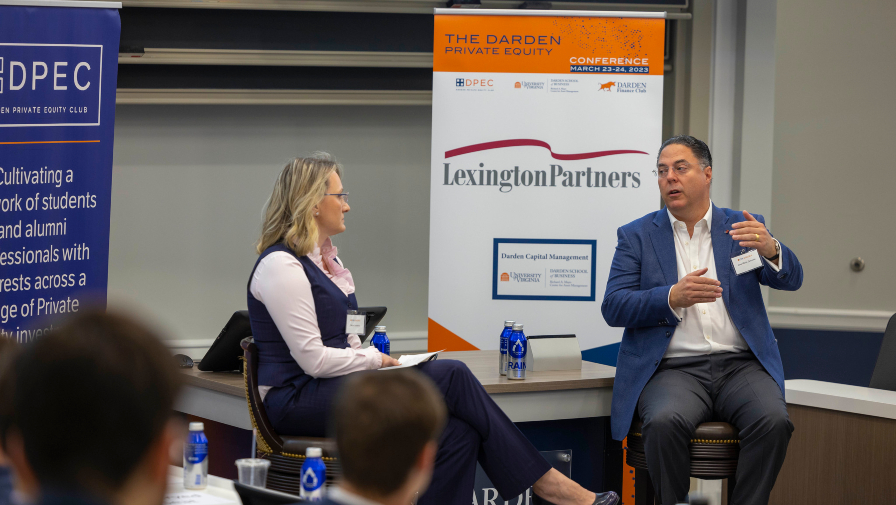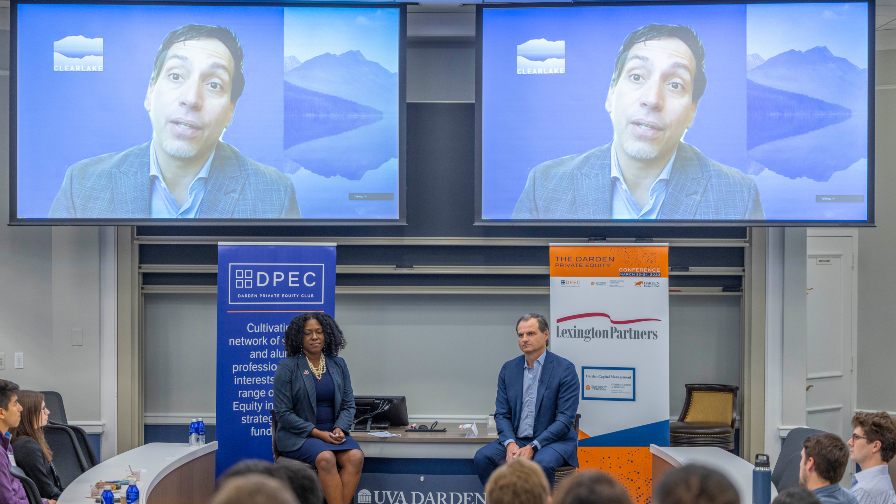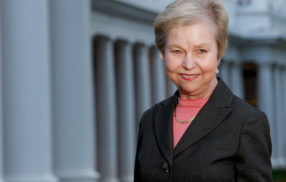
Darden Private Equity Conference Explores Opportunities in a Shifting Market
By David Hendrick
University of Virginia Darden School of Business Professor Susan Chaplinsky’s legacy was on full display at the recent Darden Private Equity Conference as an overflow audience explored pressing issues in the industry with a range of experts, including many Darden alumni.
Chaplinsky, who died in December 2022, was a leading light in the private equity and venture capital space at Darden and beyond, teaching popular classes, advising the Private Equity Club and producing widely respected and cited research. The keen interest among students and a global foundation of leading alumni is in part a testament to her enduring influence on Grounds, where she “continually raised the bar for everyone,” in the words of Rotunda Capital Partners Managing Partner John Fruehwirth (MBA ’96), who helped dedicate the annual conference to Chaplinsky.
The conference, which was produced by the Darden Private Equity Club and co-sponsored by the Richard A. Mayo Center for Asset Management, covered the breadth of modern private equity, with featured speakers discussing private equity’s role in global energy and infrastructure projects, health care, and the current state of the industry amid higher interest rates, among other topics.
Selby Lane Managing Director Caitlin Fitzmaurice (MBA ’11), who spoke on a panel regarding the current state of private equity, said private market valuations have been turning lower or “resetting” recently, following similar movement in public markets.
“We are certainly seeing those valuations start to come down in terms of the transaction multiples at which deals are getting done — although there aren’t a lot of deals getting done right now,” Fitzmaurice said, adding that attempting to determine the “correct valuations” for investments can be as much art as science.
In early stage or venture investments, Fitzmaurice said she doesn’t expect a significant correction, but said she has seen some pullback in activity level and an additional note of caution from investors in early stage funding.
Panelists discussing private equity in health care shared similar sentiments, noting a cooling in some sectors driven by factors including higher interest rates and staffing difficulties. Church Moore, a UVA graduate who serves as partner at Kelso Private Equity, said that while the company had a successful track record with provider-owned healthcare practices in recent years, the so-called great resignation created its own unexpected challenges, which, combined with higher interest rates, had “put a bit of a brake on our interest in provider practice business models.”
Adding to the caution are sellers’ valuation expectations, which no longer seem in-line with the market reality, he said.
Jose Maria Zertuche (MBA ‘00), who leads BlackRock’s Latin America Infrastructure Investment Group, spoke of the relatively recent maturation of the private equity industry’s interest in Latin American infrastructure. Zertuche co-founded the Mexican private equity firm Infraestructura Institucional in 2010, growing the company at a time when governments in Latin America began looking for ways to foster and finance investment into infrastructure in an effort to boost the economy. Operating in relatively new territory that would subsequently become one of the fastest-growing sectors in private equity, Zertuche and his firm raised two funds before selling the company to BlackRock in 2015.
In emerging markets, governments are often constrained of resources, Zertuche said, and private equity has demonstrated an ability to get projects done sooner and with a proven path toward “getting assets to pay for themselves.”
In addition to government interest in the sector, infrastructure has become appealing for limited partners due in part to the ability to rapidly deploy significant capital, Zertuche said. Further, there are trends driving BlackRock’s infrastructure private equity business, including digitalization, decentralization away from urban centers and deglobalization, he said. The infrastructure needed to support the digitalization of modern life, including fiber lines, cell towers and data centers, are driving significant investment, he said.
“There is really a ton of hard-wiring and infrastructure behind these things,” Zertuche said, adding, “These are the assets that will allow our future way of working to exist.”
On the deglobalization front, Zertuche said he sees “companies moving back to the Americas … creating significant needs for infrastructure of all kinds, whether south of the [U.S.] border, or even in the U.S. and Canada.”
Asked what concerns him or keeps him up at night about the sector, Zertuche said it was the “unknown unknowns,” and that his team spends “a lot of time thinking about what can go wrong.”
Still, he credited his Darden training with instilling a confidence in his ability to figure out a way forward.
“What you need is this general management training, because in the end you have to manage reality,” Zertuche said. “Having that compass as to how you are going to approach and piece apart a case, if you will, and what are the key things you need to know and focus on to solve the issues at hand, is something that is very hard to teach — and Darden teaches it very well.”
During a keynote session, attendees heard from Clearlake Capital Group Managing Partner and Co-founder José Feliciano, who helped grow the company to more than $72 billion in assets under management since its 2006 founding.
Starting the company after stints with a startup and other asset management firms, the firm was built on what he described as the perhaps “irrational belief” that there was a niche in a crowded industry for a player with a novel approach, specifically, one he described as a “multi-industry focus with an all-weather strategy that would allow you to capture interesting dislocations — but also capture value when humming.”
The company has formalized its O.P.S. approach to the point of copyrighting the term, a proprietary combination of operations, people and strategy.
After years of booming growth fueled in part by low interest rates, Feliciano, who was in conversation with Lexington Partners Partner John Loverro (MBA ’00) and Darden Private Equity Club President Sukari Brown, said the company is feeling its way through a changed landscape, the likes of which many investors have never experienced.

Clearlake Capital Group Managing Partner and Co-founder José Feliciano in conversation with Darden Private Equity Club President Sukari Brown (Class of 2023) and Lexington Partners Partner John Loverro (MBA ’00).
“There will be opportunities somewhere in this landscape, but it’s not obvious right now where those opportunities are,” Feliciano said. “We anticipate that in the next six months we are going to see a lot more distressed opportunities that could be really interesting. In perfect world, we are looking for companies that have an incredible growth profile and a bad balance sheet.”
The company’s portfolio encompasses a range of technology businesses and consumer products, and Clearlake is part of the consortium that recently purchased Chelsea Football Club. The situation was fortuitous, as Chelsea’s Russian oligarch owner was forced to sell following the war in Ukraine and the buyer pool was narrowed by various geopolitical issues and concerns.
“The worst way to sell a business is to announce to the world that you have to sell it,” Feliciano said.
View the Flickr album for more pictures from the conference. For more from the DPEC speakers, view sideline interviews from the conference with Caitlin Fitzmaurice, Frank Winslow, Church Moore and Schon Williams.
The University of Virginia Darden School of Business prepares responsible global leaders through unparalleled transformational learning experiences. Darden’s graduate degree programs (MBA, MSBA and Ph.D.) and Executive Education & Lifelong Learning programs offered by the Darden School Foundation set the stage for a lifetime of career advancement and impact. Darden’s top-ranked faculty, renowned for teaching excellence, inspires and shapes modern business leadership worldwide through research, thought leadership and business publishing. Darden has Grounds in Charlottesville, Virginia, and the Washington, D.C., area and a global community that includes 18,000 alumni in 90 countries. Darden was established in 1955 at the University of Virginia, a top public university founded by Thomas Jefferson in 1819 in Charlottesville, Virginia.
Press Contact
Molly Mitchell
Senior Associate Director, Editorial and Media Relations
Darden School of Business
University of Virginia
MitchellM@darden.virginia.edu





